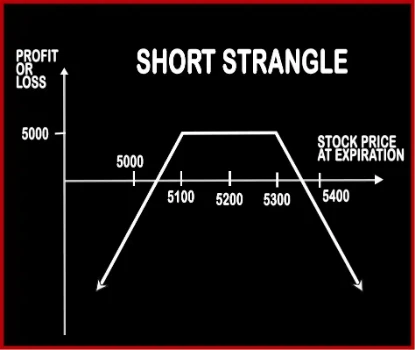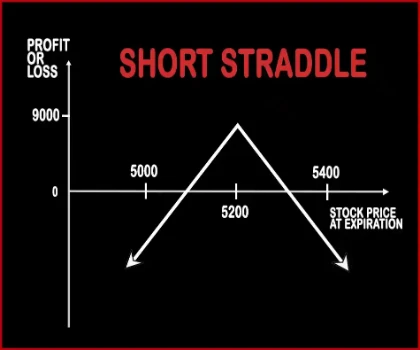Compare Strategies
| SHORT STRANGLE | SHORT STRADDLE | |
|---|---|---|

|

|
|
| About Strategy |
Short Strangle Option StrategyThis strategy is similar to Short Straddle; the only difference is of the strike prices at which the positions are built. Short Strangle involves selling of one OTM Call Option and selling of one OTM Put Option, of the same expiry date and same underlying asset. Here the probability of making profits is more as there is a spread between the two strike prices, and if |
Short Straddle Option strategyThis strategy is just the opposite of Long Straddle. A trader should adopt this strategy when he expects less volatility in the near future. Here, a trader will sell one Call Option & one Put Option of the same strike price, same expiry date and of the same underlying asset. If the stock/index hovers around the same levels then both the options will expire worthless an .. |
SHORT STRANGLE Vs SHORT STRADDLE - Details
| SHORT STRANGLE | SHORT STRADDLE | |
|---|---|---|
| Market View | Neutral | Neutral |
| Type (CE/PE) | CE (Call Option) + PE (Put Option) | CE (Call Option) + PE (Put Option) |
| Number Of Positions | 2 | 2 |
| Strategy Level | Advance | Advance |
| Reward Profile | Limited | Limited |
| Risk Profile | Unlimited | Unlimited |
| Breakeven Point | Lower Break-even = Strike Price of Put - Net Premium, Upper Break-even = Strike Price of Call+ Net Premium | Lower Breakeven = Strike Price of Put - Net Premium, Upper breakeven = Strike Price of Call+ Net Premium |
SHORT STRANGLE Vs SHORT STRADDLE - When & How to use ?
| SHORT STRANGLE | SHORT STRADDLE | |
|---|---|---|
| Market View | Neutral | Neutral |
| When to use? | This strategy is perfect in a neutral market scenario when the underlying is expected to be less volatile. | This strategy is work well when an investor expect a flat market in the coming days with very less movement in the prices of underlying asset. |
| Action | Sell OTM Call, Sell OTM Put | Sell Call Option, Sell Put Option |
| Breakeven Point | Lower Break-even = Strike Price of Put - Net Premium, Upper Break-even = Strike Price of Call+ Net Premium | Lower Breakeven = Strike Price of Put - Net Premium, Upper breakeven = Strike Price of Call+ Net Premium |
SHORT STRANGLE Vs SHORT STRADDLE - Risk & Reward
| SHORT STRANGLE | SHORT STRADDLE | |
|---|---|---|
| Maximum Profit Scenario | Maximum Profit = Net Premium Received | Max Profit = Net Premium Received - Commissions Paid |
| Maximum Loss Scenario | Loss = Price of Underlying - Strike Price of Short Call - Net Premium Received | Maximum Loss = Long Call Strike Price - Short Call Strike Price - Net Premium Received |
| Risk | Unlimited | Unlimited |
| Reward | Limited | Limited |
SHORT STRANGLE Vs SHORT STRADDLE - Strategy Pros & Cons
| SHORT STRANGLE | SHORT STRADDLE | |
|---|---|---|
| Similar Strategies | Short Straddle, Long Strangle | Short Strangle |
| Disadvantage | • Unlimited loss is associated with this strategy, not recommended for beginners. • Limited reward amount. | • Unlimited risk. • If the price of the underlying asset moves in either direction then huge losses can occur. |
| Advantages | • Higher chance of profitability due to selling of OTM options. • Advantage from double time decay and a contraction in volatility. • Traders can book profit when underlying asset stays within a tight trading range. | • A trader can earn profit even when there is no volatility in the market . • Allows you to benefit from double time decay. • Trader can collect premium from puts and calls option . |